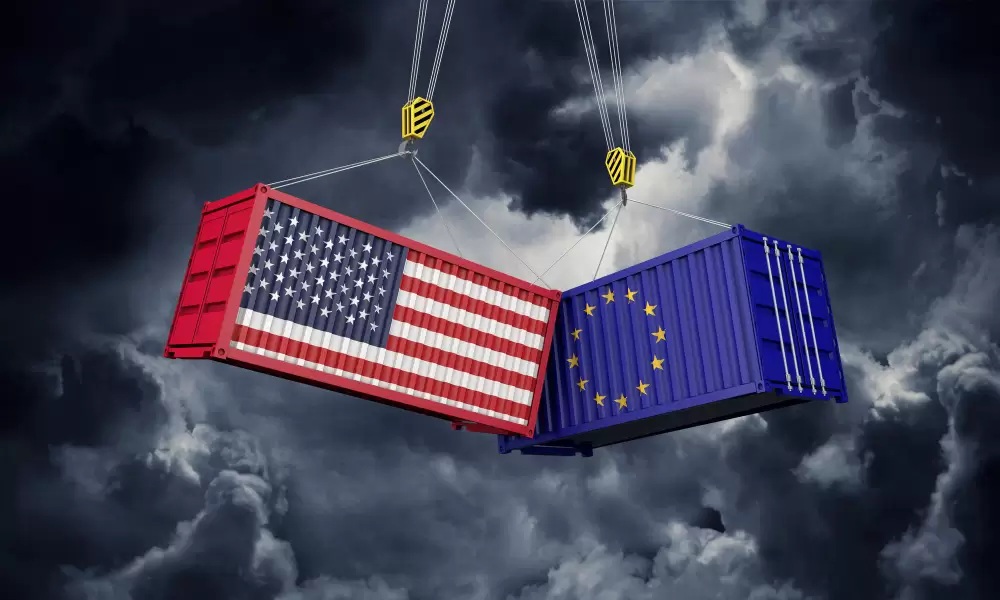The European Union has issued a stark warning to the United States, threatening to impose nearly €100 billion (£87 billion) in tariffs on a broad array of American products unless President Donald Trump agrees to a trade deal by the end of next week.
On Wednesday, the European Commission revealed plans to merge two previously drafted lists of US imports that could be subject to retaliatory duties.
These include a €21 billion list targeting items such as bourbon, poultry, and alcohol.
It also comes along with a newer €72 billion list that hits key sectors like automobiles and aerospace, notably affecting Boeing aircraft.
Should the EU member states approve the measure, with a vote expected imminently, the consolidated €93 billion tariff package could take effect as early as August 7.
Olof Gill, spokesperson for EU trade policy, stated that while Brussels remains focused on securing a negotiated resolution with Washington, preparations are underway to activate countermeasures if diplomacy fails.
“To make our response clearer, simpler, and more powerful, we are merging lists one and two into a single, comprehensive list,” he explained.
EU Trade Commissioner Maroš Šefčovič was scheduled to hold talks with US Commerce Secretary Howard Lutnick on Wednesday, ahead of briefing EU ambassadors.
The tone in Brussels has noticeably hardened since Trump recently walked away from a preliminary agreement, while also threatening to slap a blanket 30% tariff on EU imports starting August 1 if no deal is reached.
Germany, home to Europe’s largest car manufacturing sector, has been one of the strongest voices pushing for a swift resolution.
The country has already been hit hard by the 27.5% tariffs imposed on its auto exports.
Now, Berlin is reportedly considering a more aggressive approach, invoking the EU’s anti-coercion instrument (ACI), often viewed as the bloc’s most powerful tool to counter economic threats.
The ACI, though still in a preparatory phase, would allow the EU to impose sweeping retaliatory actions.
These include tariffs and potentially banning specific US services, a move that could significantly impact major American tech companies.
However, officials caution that activating the ACI could take up to a year.
France has taken a more confrontational stance, calling for immediate activation of the ACI.
One EU diplomat noted that while both France and Germany discussed the mechanism during a recent meeting of EU ambassadors, there is little consensus on whether to proceed now.
“Paris is ready to pull the trigger,” the diplomat said, “but Berlin prefers to quietly prepare behind the scenes without immediate action.”
The auto industry continues to bear the brunt of the trade standoff.
Stellantis, which owns brands like Jeep and Vauxhall, reported a €300 million financial hit from the tariffs, while Volvo posted a significant drop in second-quarter performance.
French President Emmanuel Macron has long advocated for a more robust EU response to Trump’s trade threats.
Analysts say the bloc has so far missed key opportunities to show strength.
Tobias Gehrke, a senior policy fellow at the European Council on Foreign Relations, argued that the EU should have sent a strong signal after Trump’s recent tariff threats.
“The EU had good cards to play, but hesitated,” he said.
“While EU leaders often talk about negotiating from strength, that strength hasn’t translated into action.”
Gehrke believes the deadlock might only be broken by high-level diplomacy, suggesting a direct meeting between Trump.
Trump is expected in Scotland this weekend along with European leaders like Macron, German Chancellor Friedrich Merz, and Italian Prime Minister Giorgia Meloni.
This latest EU maneuver unfolds just ahead of a critical summit with China.
In China, European Commission President Ursula von der Leyen and EU Council President António Costa will meet with Chinese President Xi Jinping.
China continues to dominate trade flows with Europe, reporting a €143 billion surplus for the first half of 2025, a 20% year-on-year increase.
Notably, Chinese exports of hybrid vehicles have tripled, largely unaffected by EU tariffs introduced in 2023.
In contrast, imports of fully electric vehicles from China dropped 32% over the same period.
At the same time, China’s decision to curb exports of rare earth minerals is impacting Europe’s car manufacturers.
It is reportedly impacting particularly Germany, which rely on these materials for components like electronic window and boot mechanisms.
As transatlantic and global trade tensions continue to mount, the coming weeks may prove decisive for Europe’s economic posture and political leverage on the world stage.







